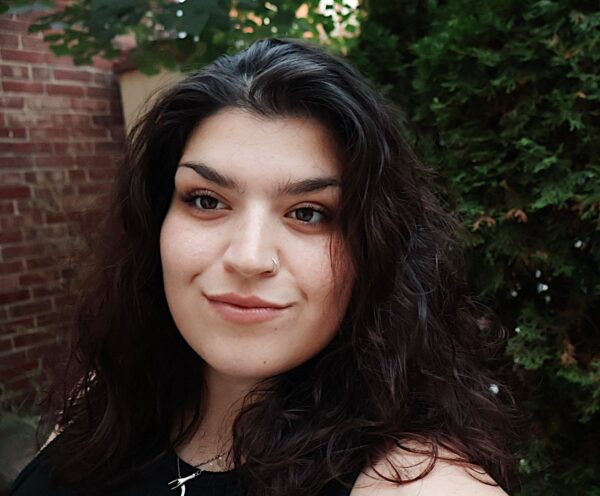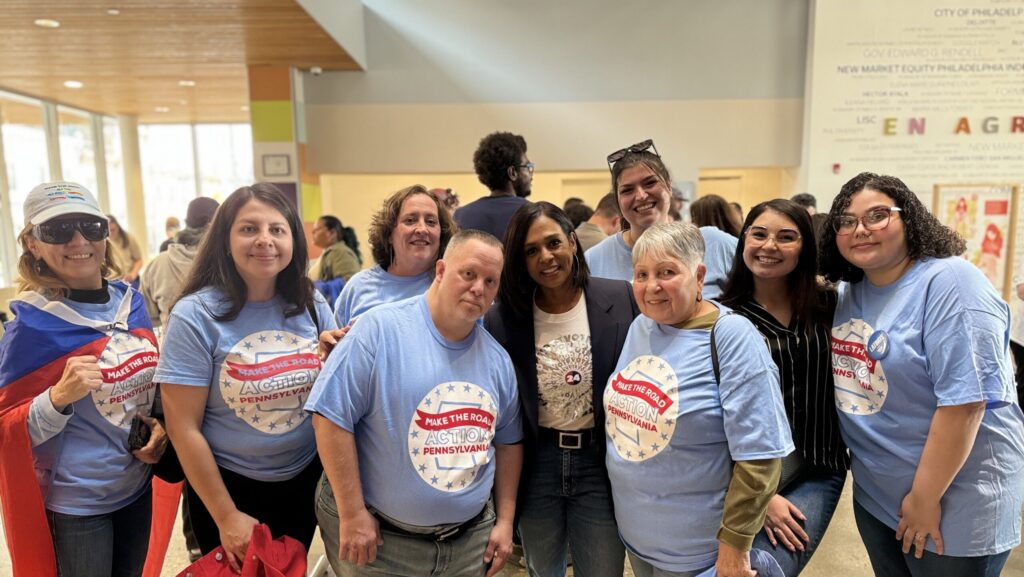 Meet Abby English (she/her/ella), a 2019 Penn State graduate with a B.A. in advertising/public relations and a minor in Spanish, whose journey in social justice and communications began as a student intern at the Penn State Center Philadelphia. Now a communications coordinator at Make the Road PA, Abby’s career trajectory embodies the transformative potential of the Center’s Social Justice Internship Program, which connects students with organizations that drive meaningful change in communities.
Meet Abby English (she/her/ella), a 2019 Penn State graduate with a B.A. in advertising/public relations and a minor in Spanish, whose journey in social justice and communications began as a student intern at the Penn State Center Philadelphia. Now a communications coordinator at Make the Road PA, Abby’s career trajectory embodies the transformative potential of the Center’s Social Justice Internship Program, which connects students with organizations that drive meaningful change in communities.
As a social justice intern, Abby worked with 215 People’s Alliance, a grassroots organization focused on political education and community engagement in Philadelphia. Through this experience, she not only refined her skills in communications and social media but also gained invaluable insights into the dynamics of movement work — learning firsthand how policies and coalitions come together to uplift underserved communities.
The Center’s partnerships, such as with 215 People’s Alliance, play a vital role in inspiring students to engage with social justice work. For Abby, these connections provided a supportive network and a launchpad for her career in community organizing. Today, she applies the lessons she learned in her internship to her work at Make the Road PA, amplifying the voices of underserved communities and advancing policies that promote equity and justice.
We talked to Abby about her journey from a Penn State intern to a full-time advocate for change, and she offered advice and inspiration for students who aspire to follow a similar path.
Can you tell us a bit about your current role with Make the Road (MTR) PA? What does a typical day look like?
Since the start of my work with MTR, there truly hasn’t been a ‘typical’ day. Joining the organization in the thick of a general election (AND in a swing state) has meant truly rolling with the punches and seeing what each day brings our way. So, in the background, I’m consistently working on big picture planning — how can our organization use communications tools to grow our membership base and advance our organizing/policy goals? In the foreground, I’m bouncing around from press conferences to protests, connecting with press and preparing members to testify in different political arenas, gathering/editing/sharing content, and remaining tuned into the work all of our teams are doing both internally and externally. Organization and planning are key in a role like this — I truly find that with proper organization, the variety in my day-to-day flow keeps things exciting yet still manageable.
What first inspired you to pursue a career in social justice and community organizing?
I was a freshman in high school when Donald Trump was first elected president. While I was already interested in social justice issues as a member of my school’s Feminism Club, the 2016 election was a truly politicizing event for me. I was already participating in my high school’s journalism program and enjoyed the business/advertising aspect of the work, but the 2016 election and its aftermath made me realize how important storytelling is when it comes to moving people toward social change. I decided I wanted to pursue a degree in advertising to learn about the psychology behind how we motivate folks to do/buy things. Then, I set my sights on using that same psychology to motivate folks to do good for and in their communities.
Reflecting on your time as a social justice intern with Penn State Center Philadelphia and 215 People’s Alliance, what skills or insights did you gain that you find yourself using today?
Networking is one of the most important skills I’ve learned. 215 People’s Alliance afforded me the opportunity to become acquainted with the social justice and movement work happening across Philadelphia and Pennsylvania and to understand how deeply connected much of this work is. I also learned to not be afraid to ask questions. In movement work, there are a lot of acronyms, shorthand, and slang terms that are used. It’s its own kind of jargon. So, asking questions is key to slowly understanding the bigger picture and seeing how all of the moving parts work together.
How did your internship experience shape your understanding of social impact work? Were there specific projects or moments that stood out to you?
215 People’s Alliance let me see firsthand how movement work gets done. From an outside perspective, it can be hard to understand how we go from protesting in the streets to enacting policies. Being on the internal side of things allowed me to learn how coalitions are formed, how connections are made with elected officials, and how we advance policy that benefits our underserved communities. Back in the early days of the pandemic, I watched our team win paid sick leave so that all restaurant employees could take care of themselves and their family members as needed. Seeing how multiple organizations can come together to put pressure on elected officials and enact policy change was rewarding, inspiring, and motivating — and further solidified in my mind the importance of working together in coalition to get things done.
Social justice work can be challenging but rewarding. What keeps you motivated in this line of work?
The people, the people, the people. “Doom-scrolling” is a very real, very isolating thing. Being in community with other folks who are deeply aware of the issues we are facing but deeply motivated to find workable solutions is incredibly inspiring. One of my favorite abolitionist authors, Mariame Kaba, says, “Hope is a discipline.” I apply this quote to my own life daily — hope is not a feeling, it is a conscious choice we make to see a better future and continue the fight our ancestors have passed down to us.

Do you have any advice for current students or recent grads who are interested in pursuing careers in social justice, communications, or community organizing?
Seek out extracurricular opportunities. Find organizations that are fighting for issues you feel aligned with and begin reaching out to them about volunteer opportunities. Community organizing is a world of its own, and the sooner you begin learning its framework from the ground up, the more prepared you will be to step into any community organizing team.
What are some of the most impactful lessons you’ve learned in your internship, current role, or other community engagement activities?
Take every opportunity, shake every hand, write down every phone number. Connections are incredibly important in organizing and, more than likely, you will run into the same folks at many different events. These people will be the ones to connect you to future opportunities, plug you into important conversations and events, and work with you to build powerful coalitions that are able to create tangible change. This work cannot be done in solitude, only in solidarity. Also, know your strengths and do not be afraid to offer them. Social justice and community organizing require an incredibly wide range of skills. Grant writing, data analysis, public speaking, tech support, etc. are all key to successful community organizing. So, don’t be afraid to lean into your strengths while remaining open to learning new skill sets.
Is there anything you’d like to say to students considering an internship with the Penn State Center Philadelphia? What should they expect from an experience like this?
Do it! My life was completely changed by the opportunity to intern with the Penn State Center. I was feeling stuck and unmotivated by the idea of working in traditional advertising. Penn State Center Philadelphia helped me to hone my career goals and find an internship opportunity perfectly aligned with those goals. Prepare to learn more about yourself and how you see yourself fitting into this confusing and chaotic world. Prepare to be challenged, but prepare to grow in ways you didn’t know were possible.
What are you reading?
Currently, I’m re-reading one of my favorites, Tuesdays with Morrie, by Mitch Albom. It’s a comfort book for me, and every time I read it, something different resonates with me.
What are you watching?
Not so proud of this one, but The Real Housewives of New Jersey. When you spend your day at work being inundated with people’s very real, very serious struggles, sometimes it’s fun to go home and watch people argue about whose diamond necklace is worth more and just laugh at the ludicrousness of it all.
What are you listening to?
Fall weather always brings me back to one of my all time favorite bands: Fleetwood Mac.
Favorite social media account to follow?
@usps.pspsps on Instagram. The account is run by a Philly-based USPS delivery man who takes photos of all of the stray cats he runs into on his journeys. Philly has a very large stray cat population, so while it’s sometimes sad to see, he’s spreading awareness about the importance of TNR programs while also sharing adorable photos of sweet kitties he meets and feeds on his journeys as a mailman. 100/10 recommend giving him a follow.
Favorite place on a Penn State campus?
I’d have to say Medlar Field at Lubrano Park. I know, hot take with Beaver Stadium sitting right next door. But I love baseball, and a handful of my close friends played on Penn State’s team during my time there. Cheap hot dogs, free tickets for students, beautiful sunset views of Mount Nittany, and America’s game — seriously, what more could a girl want?
